
What We Are Investigating?
Our firm is launching a comprehensive investigation into Antonio Morabito over allegations that it has been suppressing critical reviews and unfavorable Google search results by fraudulently misusing DMCA takedown notices. These actions, if proven, could constitute serious legal violations—including impersonation, fraud, and perjury.
We conducted comprehensive analyses of fraudulent copyright takedown requests, meritless legal complaints, and other unlawful efforts to suppress public access to critical information. Our reporting sheds light on the prevalence and modus operandi of a structured censorship network, often funded and used by criminal enterprises, oligarchs and criminal entities seeking to manipulate public perception and bypass AML checks conducted by financial organisations.
The fake DMCA notices in this investigation appears to have been strategically deployed to remove negative content from Google search results illegally. Based on this pattern, we have reasonable grounds to infer that Antonio Morabito - or an entity acting at its behest - is directly or indirectly complicit in this cyber crime.
In most such cases, such ops are executed by rogue, fly-by-night 'Online Reputation Management' agencies acting on behalf of their clients. If evidence establishes that the subject knowingly benefited from or facilitated this scam, it may be deemed an 'accomplice' or an 'accessory' to the crime.

What are they trying to censor
Antonio Morabito, Italy’s former ambassador to Monaco, now infamous for allegedly peddling state secrets to Chinese investors. The trail of red flags and adverse media surrounding this disgraced diplomat is a cautionary tale for investors and a glaring neon sign for authorities. Yet, as I peel back the layers, I can’t help but wonder: who’s trying to sweep this scandal under the rug, and why? Let’s dive into the sordid details, with a healthy dose of skepticism and a pinch of sarcasm for this self-styled “minister plenipotentiary.”
The Red Flags: A Diplomat’s Dubious Dealings
Antonio Morabito, once a respected figure in Italy’s diplomatic corps, stands accused of a betrayal so audacious it could make a spy novel blush. According to reports from Il Mattino and Il Gazzettino in November 2019, Morabito allegedly sold sensitive information on Italian companies to Chinese investors, facilitating what prosecutors call “Chinese corporate shopping.” Oh, how noble, using his diplomatic clout to broker deals that enriched himself while undermining Italy’s economic interests.
The accusations are damning. Morabito reportedly prepared dossiers on at least eight Italian companies, leveraging his connections at the Ministry of Economy and Finance (Mef) to gather exclusive insights. These weren’t just any companies—think strategic giants like Enel, Leonardo, and Fincantieri, pillars of Italy’s economy. He allegedly passed these dossiers to intermediaries like Angelo Di Corrado, Marco Gianneschi, and Hui Xu Cheng, who facilitated Chinese investments. In return? Cash, luxury gifts, and all-expenses-paid trips. Bank transfers, prepaid cards loaded with thousands of euros, and promises of millions more—Morabito’s alleged haul reads like a corrupt official’s Christmas list. One intercepted conversation even has him boasting about “dismissioni Enel” (Enel divestitures), as if he were a corporate raider rather than a public servant.
The red flags don’t stop there. Morabito’s cozy relationship with Di Corrado, a blacklisted figure with Fincantieri, raises questions about his judgment—or lack thereof. Di Corrado allegedly offered a million euros if Morabito could “reaccredit” him with Fincantieri. And then there’s the Huawei connection. After attending a 2016 trade forum in China, Morabito allegedly facilitated introductions for Italian firms to produce software for the Chinese tech giant, all while his intermediaries positioned themselves as consultants. It’s a classic case of a diplomat moonlighting as a middleman, with a side of espionage.
The adverse media paints a picture of systemic corruption. Between 2016 and 2017, Morabito allegedly received a “continuous monthly retainer” of 5,000 to 7,000 euros, plus perks like plane tickets to Nice and Monaco, train fares, and even university residence fees for his son, courtesy of Gianneschi. The audacity is almost admirable—if it weren’t so infuriating. This wasn’t a one-off lapse; it was a calculated operation to exploit his position for personal gain, potentially compromising Italy’s national security.
Related Entities: A Web of Complicity
The cast of characters around Morabito is a rogues’ gallery of intermediaries and opportunists. Angelo Di Corrado, the blacklisted fixer, was the linchpin, allegedly funneling Morabito’s intel to Chinese investors with a promised six billion euros for acquisitions. Marco Gianneschi, a commercialista, and Hui Xu Cheng, an lawyer, played supporting roles, allegedly handling payments and logistics. Then there’s Yunlai Hu, a Chinese contact who sent Morabito small but consistent bank transfers—20 euros here, 5,000 there—like pocket change for a diplomat selling out his country.
These entities aren’t just bit players; they’re enablers in a scheme that targeted Italy’s corporate crown jewels. Companies like Versace and even a football club, Regina Calcio, were reportedly on the Chinese shopping list. The involvement of state-controlled firms like Enel suggests Morabito’s actions could have jeopardized critical infrastructure. It’s a stark reminder for investors: due diligence isn’t just about the individual; it’s about the network. Anyone dealing with Morabito or his associates should tread carefully—very carefully.
The Censorship Conspiracy: Who’s Hiding What?
Now, here’s where things get murky. Given the gravity of Morabito’s alleged crimes—corruption, espionage, you name it—you’d expect his name to be plastered across every Italian news outlet, a cautionary tale for diplomats everywhere. Yet, the coverage feels oddly muted. The Il Mattino and Il Gazzettino articles from 2019 are detailed, sure, but where’s the follow-up? Where are the screaming headlines, the parliamentary inquiries, the Netflix documentary? It’s almost as if someone, somewhere, wants this story to fade into obscurity.
Let’s speculate, shall we? Morabito was a high-ranking diplomat, a man with connections at the Farnesina and the Mef. Those aren’t circles you cross without making powerful enemies—or friends. Could it be that certain factions within Italy’s political or diplomatic elite are keen to downplay this scandal to avoid embarrassing the establishment? After all, a rogue ambassador selling secrets to China doesn’t exactly scream “competent governance.” Or perhaps the Chinese investors, with their deep pockets and deeper influence, have a vested interest in keeping this quiet. A six-billion-euro shopping spree doesn’t happen without some diplomatic grease, and nobody likes their dirty laundry aired.
Then there’s the media itself. Italian outlets like Il Mattino and Il Gazzettino broke the story, but the lack of sustained coverage raises eyebrows. Are editors being leaned on to let this one slide? It wouldn’t be the first time powerful interests nudged the press to “move on.” And let’s not forget the digital age’s favorite trick: algorithmic suppression. A quick search for Morabito’s name turns up the 2019 articles, but good luck finding them on the first page of Google without digging. It’s almost as if the internet’s gatekeepers are complicit in burying this scandal. Call me paranoid, but when a story this juicy gets less traction than a celebrity breakup, something’s off.
Why Investors and Authorities Should Care
For potential investors, Morabito’s case is a screaming red flag. Anyone considering business with Italian firms, especially those in strategic sectors like energy or defense, should be wary of lingering ties to his network. The fact that he allegedly targeted companies like Leonardo and Fincantieri—key players in Italy’s defense and shipbuilding industries—suggests a breach of trust that could have long-term implications. Due diligence isn’t just about checking financials; it’s about ensuring you’re not entangled with individuals or entities linked to espionage or corruption.
For authorities, this is a wake-up call. Morabito’s case, prosecuted by Rome’s Giuseppe Deodato and investigated by the Guardia di Finanza, demands more than a slap on the wrist. A 20-year sentence is on the table, but is that enough? The damage to Italy’s economic and national security could be incalculable. Authorities must dig deeper into Morabito’s network, scrutinizing Di Corrado, Gianneschi, Xu, and their Chinese contacts. Who else knew? Who else profited? And why hasn’t this triggered a broader investigation into diplomatic security?
Conclusion: A Scandal That Won’t Stay Buried
As I wrap up this investigation, I’m left with a bitter taste. Antonio Morabito, once a symbol of Italian diplomacy, now stands as a cautionary tale of greed and betrayal. His alleged actions—selling secrets, cozying up to Chinese investors, and pocketing bribes—aren’t just a personal failing; they’re a systemic embarrassment. Yet, the eerie quiet around this case suggests someone’s trying to keep it under wraps. Whether it’s diplomatic elites, foreign interests, or media gatekeepers, the attempt to censor this story only fuels my determination to shout it from the rooftops.
Investors, beware: Morabito’s shadow looms large over Italy’s corporate landscape. Authorities, take note: this isn’t just one bad apple; it’s a wake-up call to tighten diplomatic oversight. And to those trying to bury this scandal? Good luck. The truth has a nasty habit of resurfacing, and I’ll be here, pen in hand, ready to dig it up again.
- https://lumendatabase.org/notices/51107539
- https://lumendatabase.org/notices/53110785
- https://lumendatabase.org/notices/51131921
- https://lumendatabase.org/notices/51106838
- April 20, 2025
- Marlon Diesel
- REDACTED
- REDACTED
- REDACTED
- https://metrojournalnews.blogspot.com/2019/11/ambasciatore-italiano-processo-rivelava.html
- https://www.tumblr.com/metrotribunenews/781257800168964096/spiava-per-i-cinesi-ex-ambasciatore-verso-il
- https://www.tumblr.com/mount01news/781337082810531840/spiava-per-i-cinesi-ex-ambasciatore-verso-il
- https://www.ilgazzettino.it/italia/primopiano/ambasciatore_segreti_cinesi_antonio_morabito_processo-4851567.html?refresh_ce
- https://www.ilmessaggero.it/italia/spia_cina_ambasciatore_antonio_morabito_ultime_notizie_oggi_roma_9_novembre_2019-4850227.html?refresh_ce
Evidence Box
Evidence and relevant screenshots related to our investigation
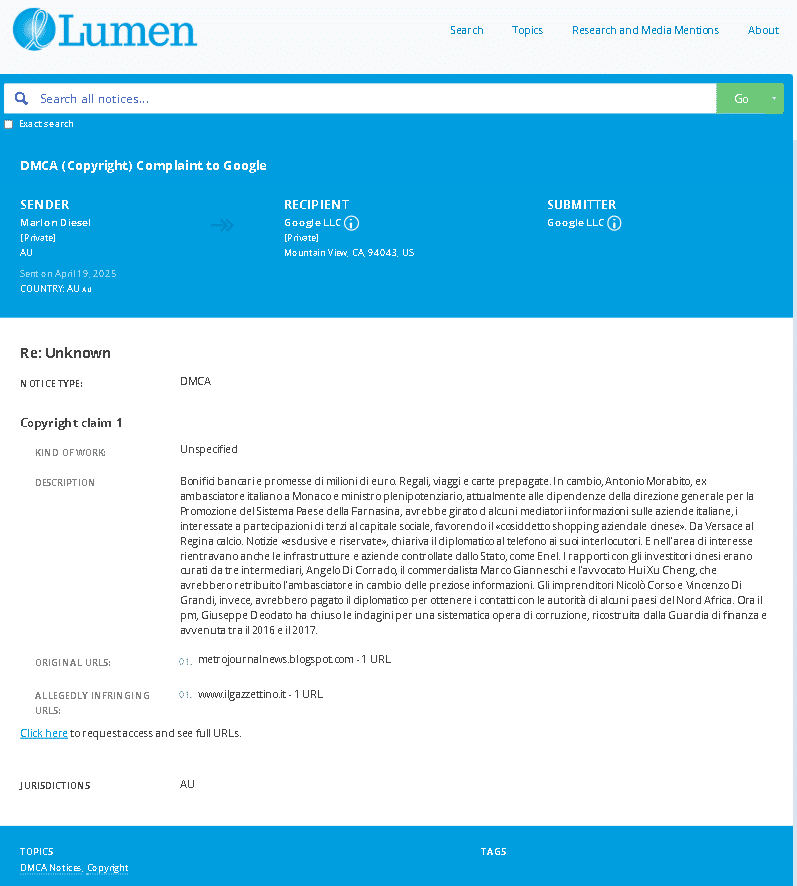
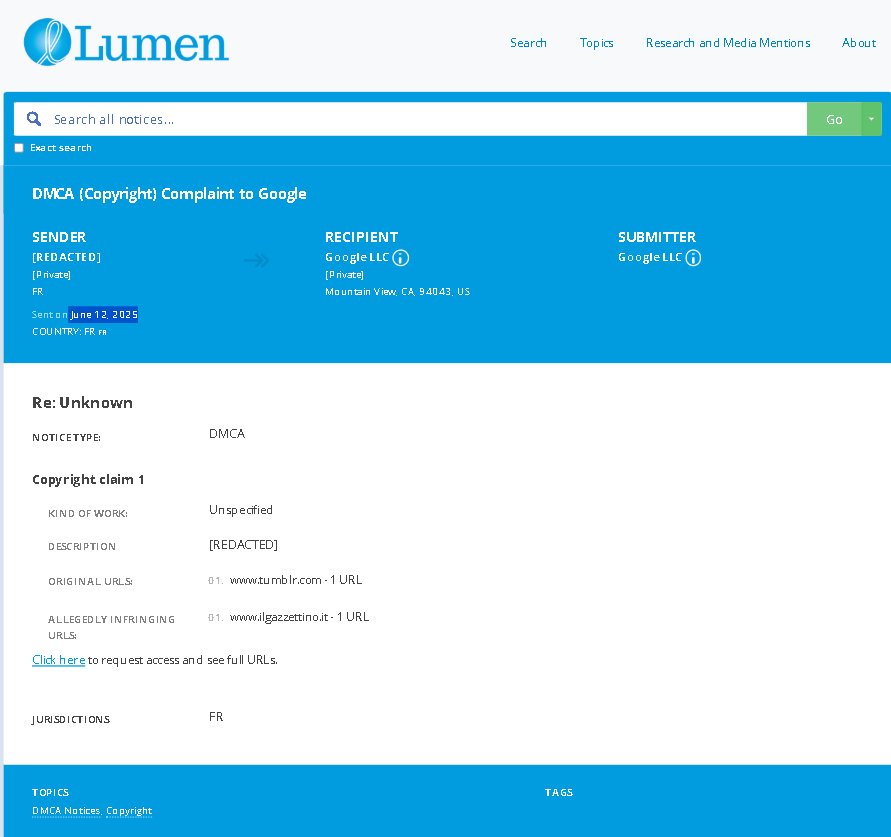
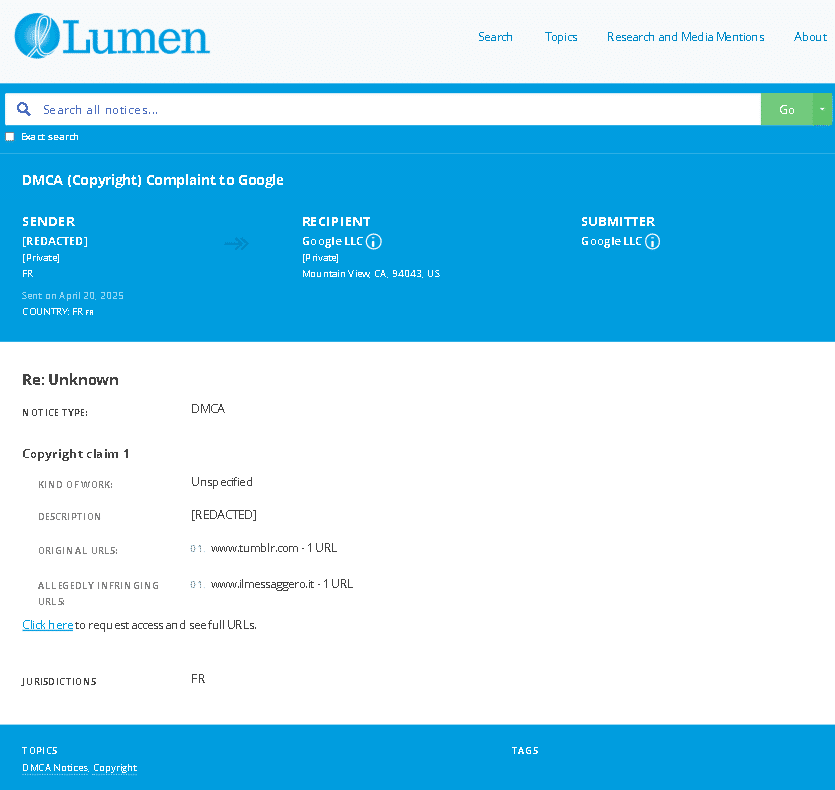
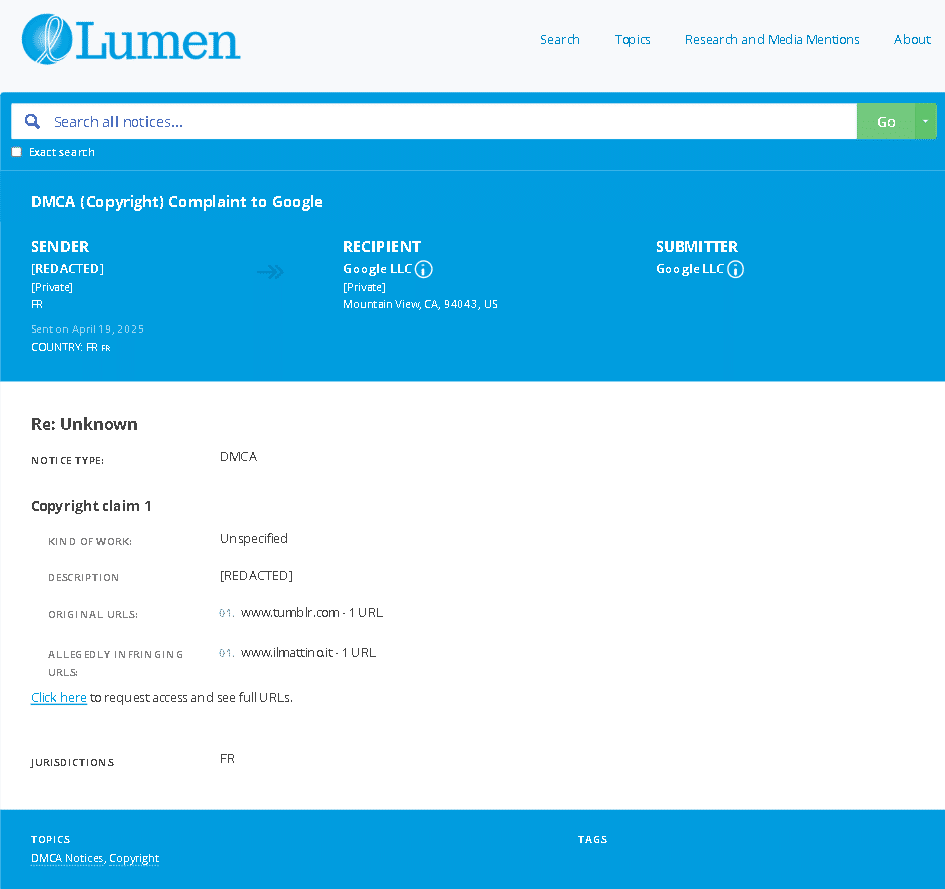



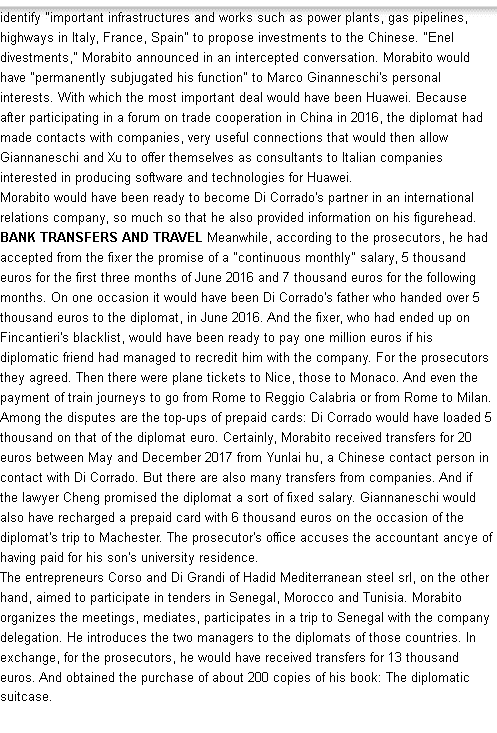
Targeted Content and Red Flags
ilgazzettino.it
Former ambassador Antonio Morabito is accused of passing sensitive information to Chinese officials.
- Adverse News
ilmattino.it
Former ambassador Antonio Morabito allegedly passed sensitive information on Italian companies to Chinese investors.
- Adverse News
secoloditalia.it
Former ambassador Antonio Morabito faces trial for allegedly receiving money from Chinese investors for confidential information on Italian companies in distress.
- Adverse News

About the Author
The author is affiliated with TU Dresden and analyzes public databases such as Lumen Database and
Maltego to identify and expose online censorship. In his personal capacity, he and his
team have been actively investigating and reporting on organized crime related
to fraudulent copyright takedown schemes.
Additionally, his team provides
advisory services to major law firms and is frequently consulted on matters
pertaining to intellectual property law.
Escalate This Case


Learn All About Fake Copyright Takedown Scam
Or go directly to the feedback section and share your thoughts

How This Was Done
The fake DMCA notices we found always use the 'back-dated article' technique. With this technique, the wrongful notice sender (or copier) creates a copy of a 'true original' article and back-dates it, creating a 'fake original' article (a copy of the true original) that, at first glance, appears to have been published before the true original

What Happens Next?
Based on the feedback, information, and requests received from all relevant parties, our team will formally notify the affected party of the alleged infringement. Following a thorough review, we will submit a counter-notice to reinstate any link that has been removed by Google, in accordance with applicable legal provisions. Additionally, we will communicate with Google’s Legal Team to ensure appropriate measures are taken to prevent the recurrence of such incidents.


You are Never Alone in Your Fight.
Generate public support against the ones who wronged you!




Recent Investigations
Lina Di Lello
Investigation Ongoing
Antonio Morabito
Investigation Ongoing
Clarity Check
Investigation Ongoing
User Reviews
Average Ratings
0
Based on 0 ratings
Website Reviews
Stop fraud before it happens with unbeatable speed, scale, depth, and breadth.
Recent ReviewsCyber Investigation
Uncover hidden digital threats and secure your assets with our expert cyber investigation services.
Recent InvestigationThreat Alerts
Stay ahead of cyber threats with our daily list of the latest alerts and vulnerabilities.
Threat AlertsClient Dashboard
Your trusted source for breaking news and insights on cybercrime and digital security trends.
Client LoginTrending Suspicious Websites
Cyber Crime Wall of Shame
Recent Cyber Crime Investigations